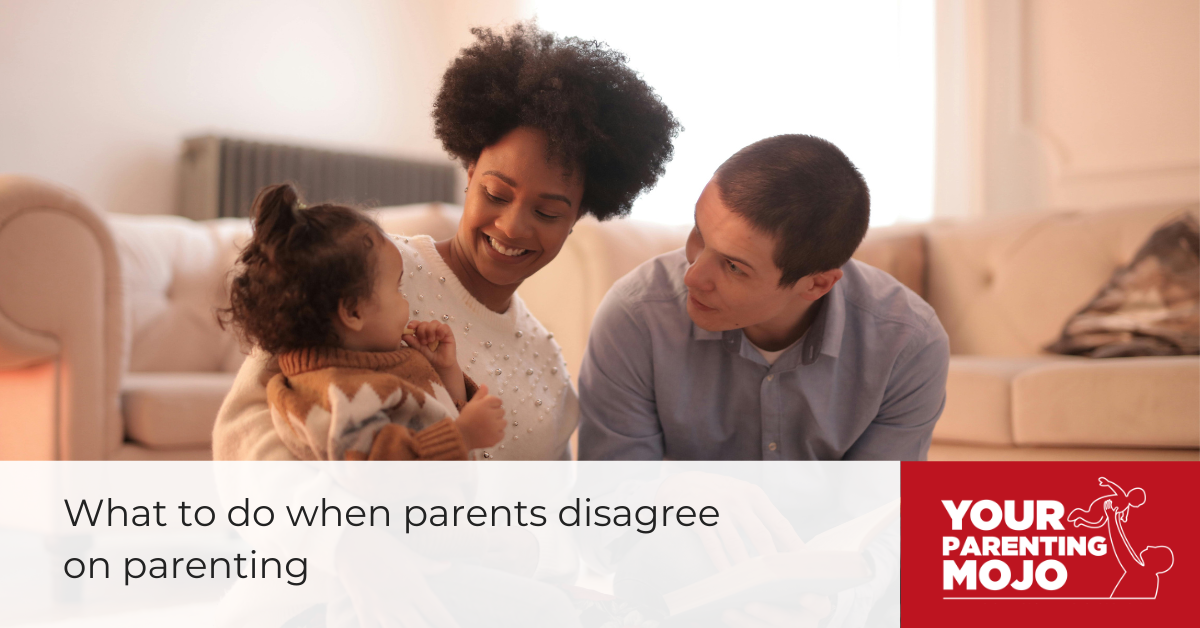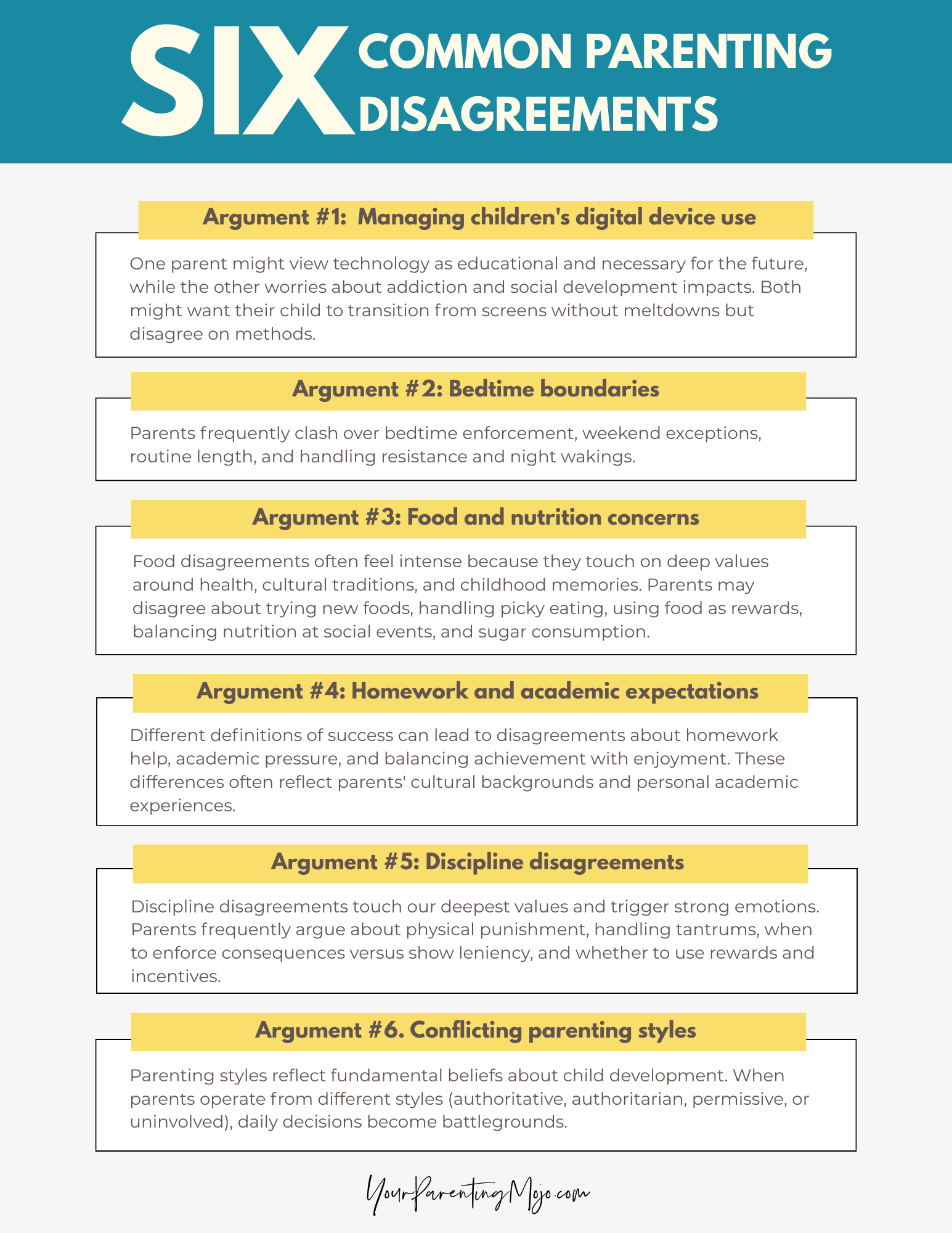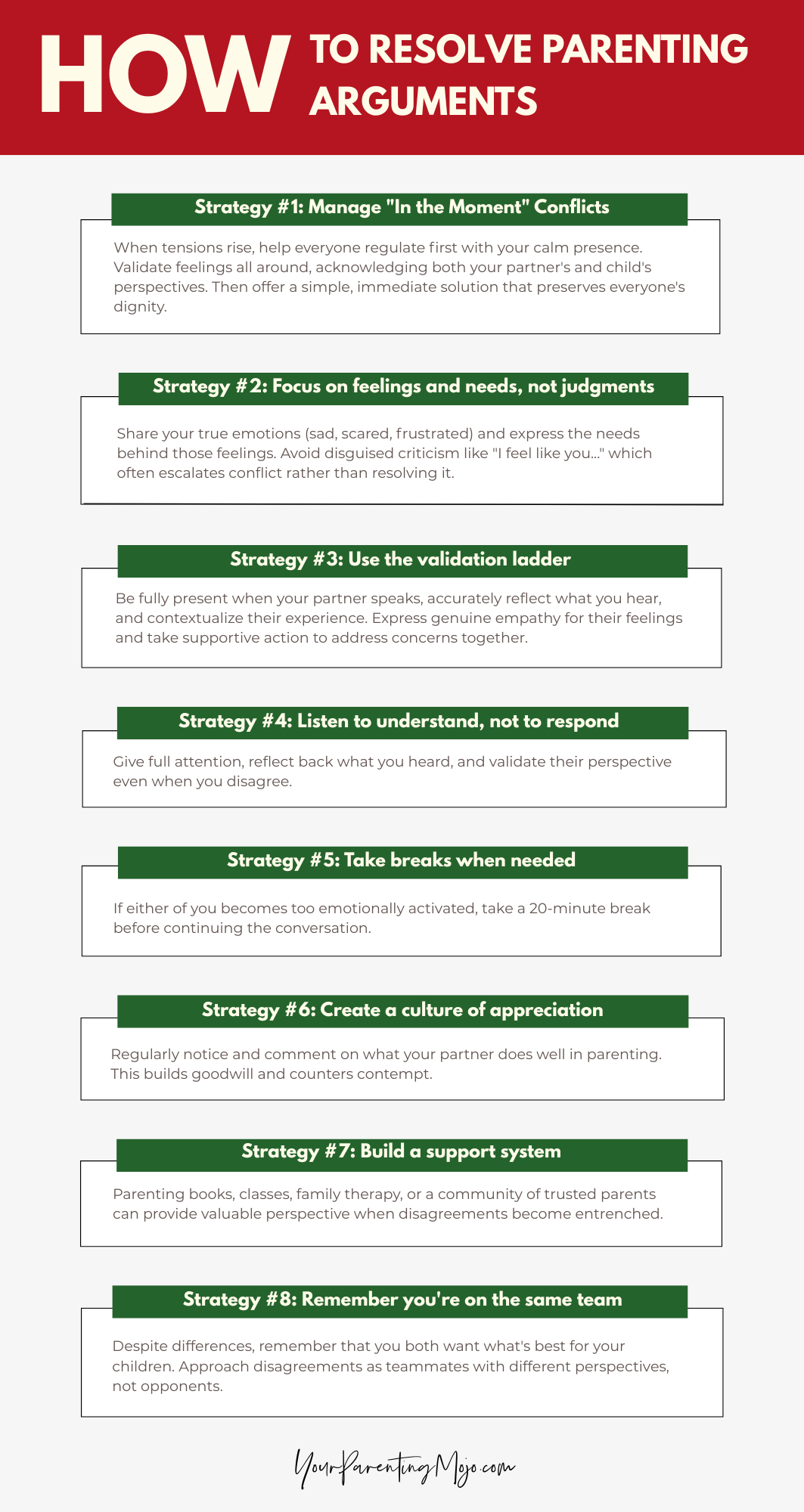What to Do When Parents Disagree on Parenting

Key takeaways
- Parents may argue about parenting due to different childhood experiences, stress, and clashing parenting philosophies.
- The most common parenting disagreements are screen time, bedtime routines, food choices, homework expectations, discipline approaches, and conflicting parenting styles.
- Parenting arguments get stuck because of the “Four Horsemen” communication patterns: criticism, defensiveness, contempt, and stonewalling make resolution impossible.
- How can parents handle disagreements in the moment? Help everyone regulate first, validate feelings all around, and offer simple solutions that respect both parents.
- What strategies help resolve parenting conflicts? Focus on feelings and needs, use the validation ladder, listen to understand, and remember you’re on the same team
Do you and your parenting partner have the same fights over and over again? Does one of you want to take a more intentional approach to parenting while the other prefers to follow their intuition? Or perhaps you keep hitting the same wall when discussing discipline, screen time, or bedtime routines? This might sound like:
You: “I wish you wouldn’t yell at the kids.”
Partner: “I don’t yell at them as much as YOU do!” or: “Yeah, because you’re such a perfect parent, with all your reading and podcasts…” or: [walks away in silence]
Maybe you don’t even bring these topics up anymore, because you know it’s too triggering – so you just exist in uneasy silence.
If you’re nodding your head, I want you to know that you are not the only one. It might have seemed like everything was fine before we had kinds, but we come from such different places that we disagree a lot on how we parent our kids!
In this post we’ll look at why parents argue, what they commonly disagree about, and how to work through these challenges together. The goal isn’t to never disagree, but to handle your differences in ways that make your relationship stronger. This also shows your children how to work through conflicts in healthy ways.
Why do parents argue about parenting?
Parents argue about parenting for several important reasons:
Reason #1: Different childhood experiences shape our expectations
How we were raised strongly affects how we think children should be raised. If you grew up where kids were supposed to be quiet and follow rules, but your partner grew up where kids were encouraged to speak their minds, you might not agree about how much input children should have in family choices.
These effects are heightened when one or both of you has experienced trauma in childhood, which can shape how you respond to your child’s difficult behavior. (If you need help understanding the root causes of your reactivity and want practical tools to address them, check out the Calm Parent Toolkit.)
Reason #2: Stress amplifies parenting tensions
When parents are tired, stressed out, or have too much going on, small parenting differences can escalate quickly. When you’re not getting enough sleep with a new baby, or when money is tight, even tiny disagreements can feel like huge problems.
Reason #3: Parenting philosophies often clash
Some parents value structure and rules, while others focus more on freedom and letting children make choices. These basic differences in parenting style can lead to arguments about everyday decisions.
6 Common parenting disagreements
There are six topics that parents tend to argue about more than others:

Argument #1: Managing children’s digital device use
In our digital world, screen time has become one of the most common sources of parenting arguments. A parent might think technology helps kids learn and get ready for the future. The other parent might worry it could become a problem and affect how kids make friends. And both of you might wish that your child would be able to get off screens without a meltdown, but have different ideas about how to do that.
Argument #2: Bedtime boundaries
How can we get our kids to stay in bed at bedtime? This seemingly simple question sparks countless parenting disagreements. One parent thinks that a strict routine is the answer, while the other wants to be flexible and spontaneous.
Parents frequently disagree about:
- How strictly to enforce bedtimes
- Whether weekends should have different rules
- Bedtime routines and how long they should take
- How to handle bedtime resistance and night wakings
Argument #3: Food and nutrition concerns
Food disagreements often feel so intense because they touch on deep values around health, cultural traditions, and even memories from our own childhoods. When one parent grew up with home-cooked meals every night while the other was raised with more convenience foods, expectations around family meals can clash dramatically.
Parents may disagree not just about what foods to serve but about broader food-related questions:
- Should children be required to try everything on their plate?
- Should they have to try a food once before declining it?
- How to handle picky eating and vegetable refusal
- Whether food should ever be used as a reward or comfort
- How to balance nutrition with flexibility at social events
- Sugar consumption and its effects on children’s behavior
Argument #4: Homework and academic expectations
Parents often disagree about how much to help with homework, appropriate academic pressure, and balancing achievement with childhood enjoyment.
Academic disagreements can stem from parents’ different definitions of success. One parent might emphasize grades and achievement while another prioritizes curiosity and enjoyment of learning. These differences may reflect each parent’s cultural background, and how well they did in school.
Argument #5: Discipline disagreements
Discipline disagreements are one of the most challenging parenting arguments. These conflicts touch on our deepest values and trigger strong emotional responses.
Parents frequently argue about:
- Whether physical punishment is ever appropriate
- How to handle tantrums and emotional outbursts
- When to enforce consequences versus when to show leniency
- Whether to use rewards and incentives to get the behavior we want to see
When parents disagree on discipline, children quickly learn to play one parent against the other. This undermines both parents’ authority and creates confusion for children about boundaries and expectations.
Argument #6. Conflicting parenting styles
Parenting styles reflect our fundamental beliefs about child development. When parents disagree on parenting styles, daily decisions can become battlegrounds.
According to Dr. Diana Baumrind, the four main parenting styles include:
- Authoritative: High warmth with clear boundaries
- Authoritarian: Strict rules with less emotional warmth
- Permissive: High warmth with fewer boundaries
- Uninvolved: Low warmth and minimal boundaries
When we each use different parenting styles, conflict seems almost inevitable. Fortunately, these four parenting styles aren’t the only ones we can use (despite what you may have read!).
Why do we get stuck in the same arguments over and over?
When we argue with our partners, we often fall into patterns that make resolution impossible. According to research by Dr. John and Julie Gottman, four communication patterns can destroy productive conversation. They call these the “Four Horsemen of the Apocalypse“:
- Criticism: Attacking your partner’s character rather than addressing a specific behavior. This sounds like “You always…” or “You never…” or “Why do you…?”
- Defensiveness: Trying to protect yourself or counter-attack when you feel criticized. This might sound like: “I let him have screen time because I needed to make dinner! What about all the chores you weren’t helping with?”
- Contempt: Showing disrespect through sarcasm, name-calling, eye-rolling, or hostile humor. This is the most destructive pattern.
- Stonewalling: Withdrawing from the conversation completely – tuning out, shutting down, or giving the silent treatment.
Most arguments begin with criticism, which triggers defensiveness. This may go on to create contempt or stonewalling, and we leave the argument feeling discouraged, overwhelmed, and hopeless.
How to resolve parenting arguments
The good news is that with the right tools, you can break these patterns and have more productive conversations about parenting. Here’s how:

Click here to download the printable guide on how to resolve parenting arguments
Resolution strategy #1: Manage “In the Moment” Conflicts
When you see your partner disciplining your child in a way that doesn’t align with your values, your instinct might be to intervene immediately. However, this often makes things worse. Instead, try this approach:
- Help everyone regulate first: Move closer, perhaps gently placing a hand on your partner’s shoulder. Use your calm presence to help de-escalate the situation.
- Validate feelings all around: Say something like, “It sounds like you’re really frustrated about the toys not being picked up, and that makes sense after a long day” (to your partner) and “It seems like you were in the middle of your game and weren’t ready to stop” (to your child).
- Offer a simple solution: “What if we set a timer for five minutes to finish the game and then clean up together?”
This approach preserves everyone’s dignity and prevents your children from learning to play one parent off against the other.
Resolution strategy #2: Focus on feelings and needs, not judgments
When sharing your perspective, avoid disguising judgments as feelings (like “I feel criticized”). Instead, identify and share your true feelings (sad, scared, frustrated) and the needs behind them.
For example, instead of saying “I feel like you’re not taking parenting seriously,” try “When we disagree about discipline, I feel worried because I need some consistency in how we respond to challenging behaviors.”
Resolution strategy #3: Use the validation ladder
Dr. Caroline Fleck’s validation ladder provides different levels of validation to use when responding to what your partner shares:
- Be present: Give your full attention without waiting for your turn to speak
- Accurately reflect: “What I’m hearing is that you feel overwhelmed when our son has a meltdown in public. Is that right?”
- Contextualize or equalize: “Given how your parents reacted to misbehavior in public, it makes sense you’d want to stop it quickly” (contextualize) or “Most parents struggle with public tantrums—I certainly do” (equalize)
- Make a proposal: “I’m wondering if you felt that mix of embarrassment and pressure to get them under control before everyone started staring?”
- Express true empathy: Share genuine reactions to what they’re sharing (“That’s so hard!”)
- Take action: Suggest what you will do differently next time to support your partner (“I’m wondering if you felt more stressed because I asked you to stop at the bank before the grocery store. Maybe next time we could make sure not to stack too many errands up for the person who has the kids.”)
Resolution strategy #4: Listen to understand, not to respond
During disagreements, we often listen just enough to form our counter-argument. Instead:
- Give your full attention to your partner
- Reflect back what you heard to make sure you understand
- Validate their perspective even if you disagree
This creates safety that allows for deeper sharing and understanding.
Resolution strategy #5: Take breaks when needed
If you notice yourself or your partner becoming too emotionally activated (heart racing, face hot, muscles tense, using any one of the Four Horsemen of the Apocalypse), it’s a sign you need a break. The brain simply cannot problem-solve effectively in this state.
Say: “I’m feeling overwhelmed right now. Can we take a 20-minute break and come back to this?”
Resolution strategy #6: Create a culture of appreciation
Make it a habit to notice and express appreciation for the things your partner does well – in parenting, and in other areas as well. This builds goodwill that makes tough conversations easier. A culture of appreciation is the antidote to contempt, which is the Horseman that is most toxic for relationships.
Resolution strategy #7: Build a support system
Sometimes parenting arguments become entrenched, with both parents convinced they’re right. In these cases, parenting books, classes, family therapy or having a community of other parents you can trust and respect your values can provide valuable perspective and tools for moving forward.
Resolution strategy #8: Remember you’re on the same team
Despite your differences, remember that you both want what’s best for your children. Approaching disagreements from this mindset—that you’re teammates with different perspectives, not opponents—changes the entire tone of parenting arguments.
Need more support with parenting arguments?
If you’re tired of going around in circles with the same parenting disagreements, you’re not alone. Parents in our community have shared how exhausting these ongoing conflicts can be—and how they’ve found relief through our supportive Parenting Membership.
The Parenting Membership provides evidence-based tools and a supportive community to help you navigate parenting with confidence. Instead of endless Google searches or conflicting advice from family members, you’ll gain access to:
- Monthly research-backed modules on common parenting challenges (including a deep dive on how to handle disagreements with partners that takes the best of the Gottmans’ approach and also overcomes its weaknesses if Gottman-based therapy didn’t work for you)
- Monthly group coaching calls where you can get personalized guidance to so you feel confident about the direction you’re headed
- A supportive community of parents to walk this journey alongside you
Parents in our membership often say that being in the membership helps them move beyond stuck points in their parenting journey.
As parent Sarah shared about how the membership helped them: “It’s been the shift in our relationship and how we navigate our conflict that has been the biggest change.”
Ready to transform your parenting struggles into opportunities for growth? Click the banner to learn more.
Final thoughts
Remember that the goal isn’t necessarily to “solve” every parenting disagreement. The real win is being able to talk about these differences without having a major blowup on an issue. Then you can try different approaches, evaluate how they’re working, and adjust as needed.
Even the most compatible parents will disagree sometimes. The difference between struggling couples and thriving ones isn’t the absence of conflict—it’s how they navigate it together.
What parenting disagreement would you like to approach differently with your partner?
Frequently Asked Questions About Parenting Disagreements
1. Why do my partner and I keep having the same arguments about parenting?
Recurring arguments often happen because of your different childhood experiences, parenting philosophies, and stress levels. How you were raised shapes your expectations for how children should behave. When you’re tired or overwhelmed, these differences feel bigger. Understanding these root causes can help you approach disagreements with more compassion and find common ground.
2. What are the most common things parents argue about?
The top disagreements include screen time management, bedtime routines, food and nutrition choices, homework expectations, discipline approaches, and conflicting overall parenting styles. These issues often feel intense because they connect to your deepest values about raising children and may reflect different priorities between structure and flexibility.
3. How can we handle a disagreement about our parenting approaches when it’s happening in front of our child?
First, try to help everyone regulate. Take a break if needed. Then validate both your partner’s and child’s feelings without taking sides. Finally, offer a simple solution that respects everyone in the moment, even if this isn’t a forever-strategy. This approach prevents your child from playing one parent against the other and models healthy conflict resolution. You can come back and talk about what to do next time the issue comes up when everyone is fully regulated.
4. What does healthy communication look like during parenting disagreements?
Healthy communication focuses on feelings and needs instead of judgments. Share what you feel (sad, scared, frustrated) and the needs behind those feelings. Listen to understand rather than to respond. Use the validation ladder: be present, reflect what you hear, contextualize their perspective, and express genuine empathy.
5. When should we take a break from a parenting discussion?
Take a break when you notice physical signs of being emotionally activated—heart racing, face hot, muscles tense. Your brain literally cannot problem-solve effectively in this state. Say something like, “I’m feeling overwhelmed right now. Can we take a 20-minute break and come back to this?” Then return to the conversation when calmer.
6. How do different parenting styles affect our disagreements?
The four main parenting styles—authoritative (warm with clear boundaries), authoritarian (strict with less warmth), permissive (warm with fewer boundaries), and uninvolved—often clash when partners favor different approaches. Even though research has shown that authoritative is the ‘best’ parenting style, it’s only the best of the four styles commonly studied. An approach that considers and meets both parent’s and child’s needs is most sustainable in the long term.
References
Baumrind, D. (1966). Effects of Authoritative Parental Control on Child Behavior. Child Development, 37(4), 887–907. https://doi.org/10.2307/1126611
Durtschi, J. A., Soloski, K. L., & Kimmes, J. (2017). The Dyadic Effects of Supportive Coparenting and Parental Stress on Relationship Quality Across the Transition to Parenthood. Journal of marital and family therapy, 43(2), 308–321. https://doi.org/10.1111/jmft.12194
Gallagher-Squires, C., Isaacs, A., Reynolds, C., & Coleman, P. C. (2023). Snacking practices from infancy to adolescence: parental perspectives from longitudinal lived experience research in England. Proceedings of the Nutrition Society, 1–9. doi:10.1017/S0029665123003592
Gottman, J.M., Cole, C., Cole, D.L. (2019). Four Horsemen in Couple and Family Therapy. In: Lebow, J.L., Chambers, A.L., Breunlin, D.C. (eds) Encyclopedia of Couple and Family Therapy. Springer, Cham. https://doi.org/10.1007/978-3-319-49425-8_179
Greene, C. A., Haisley, L., Wallace, C., & Ford, J. D. (2020, July 23). Intergenerational effects of childhood maltreatment: A systematic review of the parenting practices of adult survivors of childhood abuse, neglect, and violence. Clinical Psychology Review. https://www.sciencedirect.com/science/article/abs/pii/S0272735820300799
Lumanlan, J. (2024, April 14). How to get on the same page as your parenting partner. Your Parenting Mojo. Retrieved from: https://yourparentingmojo.com/captivate-podcast/parentingpartners/
Lumanlan, J. (2025, April 20). Parent Conflict Over Discipline: How to Get on the Same Page. Your Parenting Mojo. Retrieved from: https://yourparentingmojo.com/captivate-podcast/parents-disagree-on-discipline/


